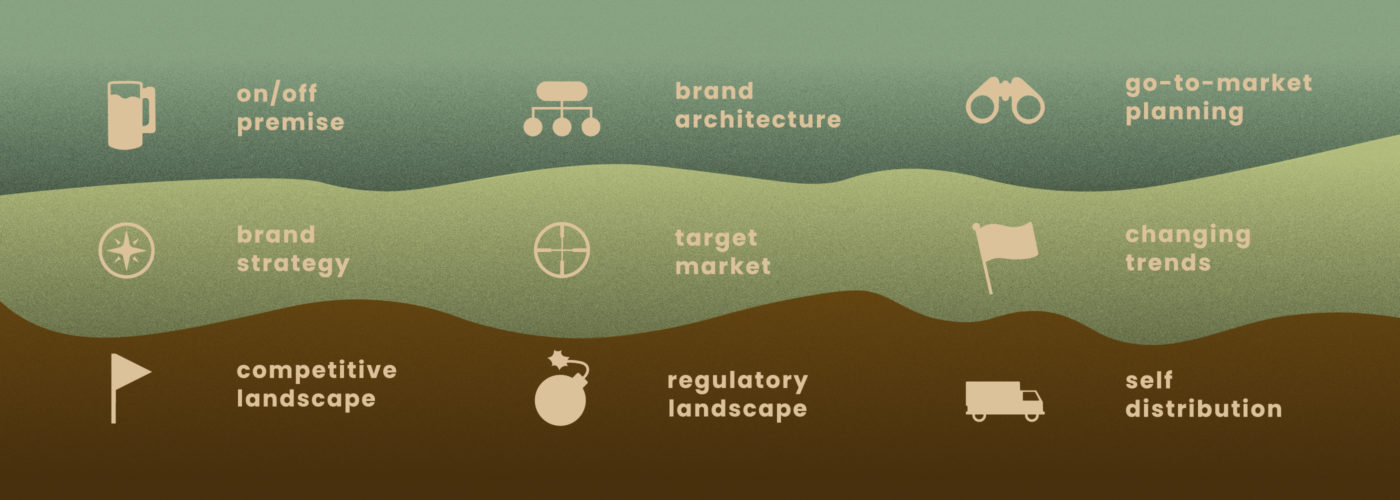Resources
The Role of Market Research in Brewery Go-to-Market Planning
Positioning your brewery brand, pricing your products and avoiding costly missteps
CODO is, as I type this, helping a multinational company launch an important brand extension. This is such an enormous investment that the company spent 10 months conducting a rigorous market research process to determine its viability. Seeing behind the scenes and wading through their detailed findings report highlights an interesting quirk we’ve seen in the beer industry.
From 2010 to 2017, we worked predominantly with breweries in planning. And during this time, we rarely saw a brewery come to the table having conducted thorough market research. Whenever we discussed this, the consensus was that craft beer is exploding, everyone wants it and this train ride will never end(!). So defining your customers, looking at competition and even thinking about your portfolio strategy wasn’t really necessary. “We’ll brew what we like and sell whatever we don’t drink,” etc.
And this actually worked out fine through the early days of the beer boom because there was so much room to grow. But as we steadily crested 6k, 7k and eventually 8k breweries in the United States, the days of coming to market with little-to-no planning are now firmly behind us.
Enter longtime CODO friend and colleague Joel Hueston, Director of Commercial Strategy at First Key Consulting, a leading brewing industry consulting firm out of Vancouver, BC. I’ve worked with Joel for five years in my role as a professor at the University of Vermont’s Business of Craft Beer Program and on a few consulting projects in between. He’s one of our favorite people in the industry and we can think of no one better to explain the importance of market research for a craft brewery (or any food and beverage business).


Kicking off, please introduce yourself—what’s your background and what lead you to working at First Key?
 Joel
Joel
My background is in corporate beer up in Canada, first with Molson and then with Coors Canada, which was a joint venture between Molson and Coors. I occupied several different roles over 23 years, including sales analysis, marketing and field marketing. I was the National Brand Director on Coors Light for a couple of years in the late 90’s. I left the beer business in 2005 to do some other things (mostly management and leadership training) but returned joining First Key in 2011 as Director of Commercial Strategy. At this point in my life, consulting is a great fit, allowing me to share my knowledge and experience with others in the industry. I love beer, always have.

Please give us a run down on market research. What is it, what are the different ways you can do it and why bother with it in the first place?
 Joel
Joel
In my opinion, conducting high quality market research is at the foundational core of any well-run business. How do you know what strategies and tactics you want to execute against if you don’t understand the market you’re competing in? Critical elements like key trends and dynamics, the competitive set, what’s working and what’s not, the regulatory landscape, local demographics, estimating and understanding costs, etc. is all priceless information that will be needed to make informed decisions.
Desk-top research can be conducted using a combination of Internet sources and official statistical reports, but I strongly suggest that be combined with grassroots analysis of the local market. Face-to-face interviews with key stakeholders in the space and a bunch of simple observations can add an invaluable layer of nuance to your business plan that can make the difference between good and great. Often the “little things” can end up being some of your most important key differentiators.

When we handle market research (as non-specialist), we focus on distributor and key account interviews (e.g. bottle shops and large chain grocery) to get a feel for the market and how our client fits into the picture. Beyond that, we focus a lot on planograms and the visual side of the competitive set to guide our positioning, branding and packaging work. What else can we do to better shore up our own process? Thanks for the free consultation!
 Joel
Joel
The branding well is very deep and I think it’s almost impossible to do TOO much research. That said, having a clear understanding of what the competition is doing is the local area is one of the most critical areas to explore. Who is the most successful local craft brewery and why? What are they doing that no one else is doing? Understanding the local nuances that resonate with customers is something that can provide critical learning and generate ideas for potential implementation. Every local landscape is different and the craft players that do their homework, differentiate and execute well are the ones that usually come out on top.

What are some of the outcomes of a full market analysis? Beyond providing the client with a lay of the land, are you developing specific portfolio and product mix suggestions as well as go-to-market strategy or is this a case by case thing?
 Joel
Joel
Every business plan is different, but a basic framework applies to most of them that includes critical go-to-market elements like portfolio mix, container strategy, distribution approach, target market, sources of volume, pricing, marketing and promotional activity, retail strategies, budgets and volume projections. Each one of those buckets involves a lot of strategic, tactical and executional detail. There is a lot to think about!

Build a stronger brand.
Sell more beer.
Join 7,500+ other beer industry folks and sign up for our monthly Beer Branding Trends Newsletter.

Beer Branding Trends 2.0

For the last 10 years, we’ve only had a few breweries in planning really dig into market research for their brewery or new beers. For the rest of the industry, research just seems like a box you check on your business plan so you look more legit when applying for a loan. Have you seen this as well, or are we in some sort of weird place where this hasn’t really mattered to our clients?
 Joel
Joel
Oh yes, I have most definitely seen this. I think it’s one of the key reasons for the “sameness” in the way many craft breweries operate these days. Like you say, it often feels like they’ve created a checklist and just executed against that. The problem when you simply copy what the guy down the street is doing is that it minimizes differentiation and stifles some of the unique elements that might have made your brewery stand out. Just because your competitor is doing something doesn’t mean it’s the right thing to do.
When you conduct thorough market research it empowers you to make good decisions based on facts and allows you to leverage unique local dynamics that can increase customer appeal. Market research shouldn’t be conducted just to please the folks at the bank. It should be the rudder that steers your go-to-market approach. You have to do the work. It will pay off.

Related, we see a lot of interest in market research in non-beer verticals—think kombucha, seltzer, RTD cocktails, cannabis and wine. Why do you think these other industries are embracing research ahead of launching new products?
 Joel
Joel
I think a significant part of the reason is that (in most cases) these are emerging categories and aren’t as established as beer. The beer industry is king of the hill and has had a “this is the way it’s done” mentality for decades. Old habits can be hard to break. As the beverage alcohol market becomes increasingly competitive, decision makers in these newer categories realize that in order to carve out a niche for themselves they will have to very clearly understand what they’re getting into and what strategic and tactical levers they will need to pull to be successful.
I think the beer category is becoming more sophisticated and that this market research gap is shrinking, but we still have a long way to go. This will be critical because everyone can see that beer’s slice of the pie is gradually shrinking. Beer volume has shown a consistent decline since the 2008 recession and if the segment is going to be stabilized, upping the market research game will be a requirement.

If a brewery wanted to conduct market research but didn’t want to pay someone to do it, are there any pointers or methods that they could use to get a 30k foot view of their market and spot any issues / opportunities?
 Joel
Joel
I will always recommend spending the money to do it right and to consider it an investment in your future and not a hard cost. However, if you must do it yourself I would suggest downloading a comprehensive business plan template and then conducting a lot of online and grassroots research, which will include scouring the Brewer’s Association website and selected brewery websites and then visiting local craft breweries (both well-regarded and otherwise) to observe the operation to chat with their customers and staff. I would also suggest scheduling meetings with local craft beer guilds, retailers and wholesalers to understand differing points of view. Attend local beer festivals and interact with consumers and brewery staff. The Chamber of Commerce and/or tourism office are also good places to visit to help understand how your brewery might best fit into the community and give back in a meaningful and compelling way.

What are some go-to-market mistakes you see breweries make over and over again?
 Joel
Joel
A lot of it has to do with cutting corners and poor management. Not having a business head in the leadership group, not developing a business plan, hiring a bad head brewer which results in brewing and serving low quality products, failing to track or control costs, neglecting taproom décor, ambience and functionality, not training staff, poor customer service, not establishing performance benchmarks and targets, expanding the distribution area when local sales are slow, trying to be all things to all people by brewing too many styles and brands of beer. Trust me, this is just a handful. I could go on and on!

What is the role of market planning in a rebranding effort? Say, to a brewery that is considering a shift in its core positioning?
 Joel
Joel
If a rebranding effort is underway then it’s likely safe to conclude that something is not working. Unless you (perhaps in conjunction with your branding partner) have assessed your business to understand what’s not working and how to address it, and then analyzed the market to understand how to execute with excellence, then you could be investing a lot of money into something that won’t resonate. The more information you have, the more informed your decisions will be, which will in turn deliver better outcomes.

You’re a top 100 brewery and are interested in launching a brand extension—say a hard seltzer. Do you think it’s important to conduct market research ahead of launching the product or is trusting your gut enough?
 Joel
Joel
Trusting your gut on its own is a scary notion. Ultimately, instinct and intuition is going to be part of the equation, but without a fact-based foundation it’s very risky. Plenty of hard seltzers have been launched over the past couple of years but only a couple really stand out. I would suggest this is not an accident. Moving forward, conducting high quality market research will be even more important as the alternative beverage market becomes more crowded. What are the long-terms prospects for this segment and why? What will make your hard seltzer more compelling than the competition? You must have great fact-based answers for these questions.

Is market research a one-and-done thing or should it be done continually beyond an initial project (foundational branding or a rebrand, for instance)? If the latter, how often should a brewery be conducting this sort of research?
 Joel
Joel
It should never be “one and done” because the market is always evolving. Researching, anticipating and adapting will be required on an ongoing basis to thrive and survive. If we don’t do that, we put our businesses in a static state and that is a recipe for disaster.

So this sounds like a no brainer for breweries in planning. Convince the established, successful breweries out there who are reading this—why should they consider market research as part of their broader strategic planning?
 Joel
Joel
Think of it this way: several years ago, you went on a road trip. You planned it carefully using traditional paper maps and it turned out pretty well. Now you want to take the same road trip and have access to much better technology but this time you decide to wing it and go from memory. However, many things have changed. There is a lot more traffic. There are new roads and some of the old roads are gone. How are you going to adapt? How will you find your way? Good luck!

We want these conversations to be evergreen and valuable for breweries for years to come. But I’ll break from this rule for a moment to ask you about the Covid pandemic. Do you have any immediate advice to help breweries weather this storm? Is there anything they need to be doing right now to ensure they make it through this winter?
 Joel
Joel
This is a difficult time for everyone. I would suggest that most of the craft breweries that were running their businesses well before Covid will weather the storm. Those that were already struggling may not. My opinion is that you must have three critical elements in place: 1) great beer, 2) a wonderful customer experience, and 3) a cool taproom. If those things aren’t happening then get busy. Beyond that, creativity is key during Covid. For craft breweries that don’t distribute to retail, make sure you are brewing limited release specialty beers that get people excited and attract them to the taproom. This presents an opportunity to be creative. For example, Great Notion Brewing in Portland, Oregon recently started releasing its beer on Smartphones. The app is filled with Great Notion’s unique forest-dwelling characters and fans can play games, read tasting notes and order cans for pick-up or local delivery. Craft breweries must be prepared to do the work and go beyond the typical chalk-lines if they want to be one of those left standing when the smoke of Covid clears.

Are you optimistic about craft beer and its chances for a strong rebound once we’re beyond the pandemic?
 Joel
Joel
Of course I am hopelessly biased but I am optimistic. I know it’s all doom and gloom right now but the sun will rise on craft beer again. In my opinion, this is almost a guarantee because it’s generationally driven. For younger Gen Xers, Millennials and Gen Z, craft beer has always been a key component of their beer landscape, and many of them have been raised on it. If someone can tell me how these consumers and the upcoming generations are going to do a 180 and suddenly develop a preference for mainstream domestic beer, I am listening.
So, I think craft beer is in good hands for many years to come. How the category is defined in the future remains to be seen, but that’s a discussion for another day!

Build a stronger brand.
Sell more beer.
Join 7,500+ other beer industry folks and sign up for our monthly Beer Branding Trends Newsletter.


